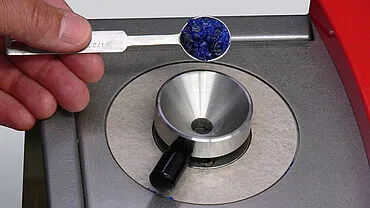his test method is used for quality-control tests on PVC compounds that have a wide range of melt viscosities. This test is specific to the measurement of
Melt Flow Rates (MFR or MFI) of poly (vinyl chloride) compounds while detecting and controlling various polymer instabilities associated with the flow rate.
The sensitivity of this test method makes it useful for correlating with processing conditions and as an aid in predicting changes in processing. This test is able
to detect and follow profound changes, which occur during extrusion, injection molding, milling, or mixing, that are due to three types of measured instability in
polymers, including Thermal instability due to temperature effect, Shear instability due to breaking of polymer bonds, and Rheological instability due to non-uniform
distributions of widely different viscosity or molecular weight elements.
We were asked to test a sample of PVC at 175° C. We choose our CEAST Modular Melt Flow Tester equipped with a motorized weight lifter for the automatic
application of the 20 kg total mass, an encoder for piston displacement measurement, an automatic cutting device, and a nozzle plugging device to plug the die
during the preheating with load. Due to the corrosive properties of PVC materials, the instrument was equipped with a special corrosion resistant kit to prevent
any interaction between the material and the metal during testing. We used a diewith a 120° entrance angle geometry and a measurement of 2.095 x 23.25 mm.
The quantity of material introduced into the barrel is 2.15 g.
The result of the test with this PVC sample showed a regular flow and a standard deviation of the encoder acquisition points of less than 1% in a single measure.
The measured MFR value was found equal to 7.27 g/10 min and related MVR 5.99 cm3/10 min, with a measured melt density of 1.2 g/cm3.



